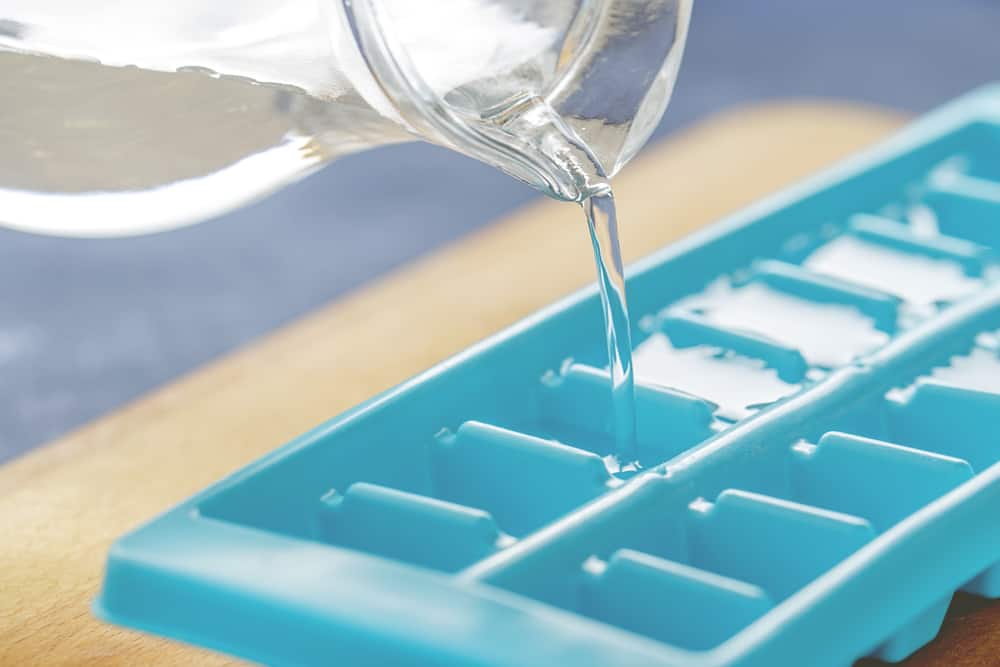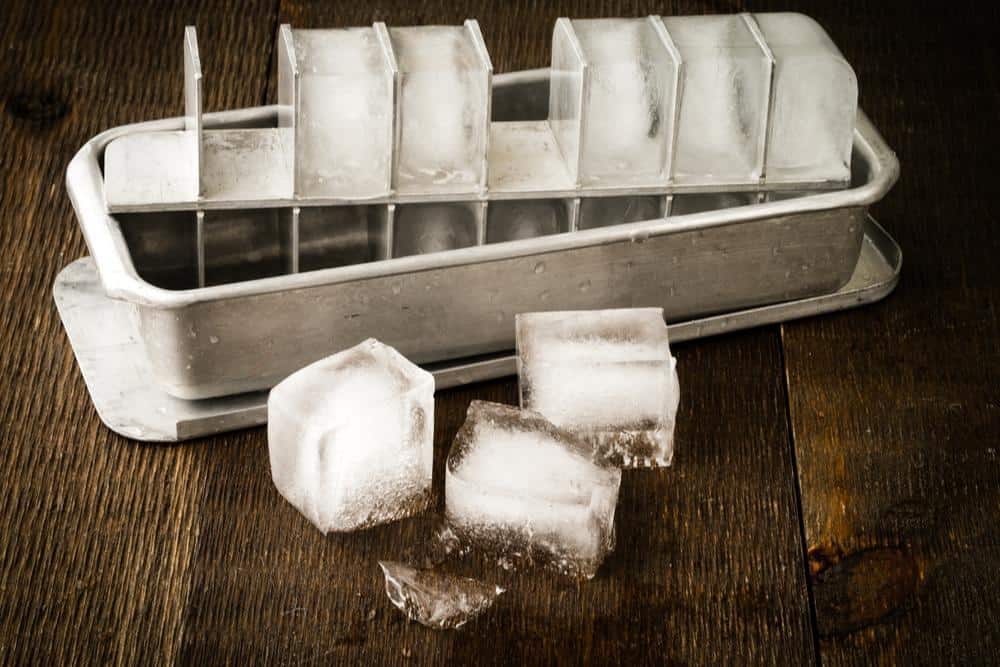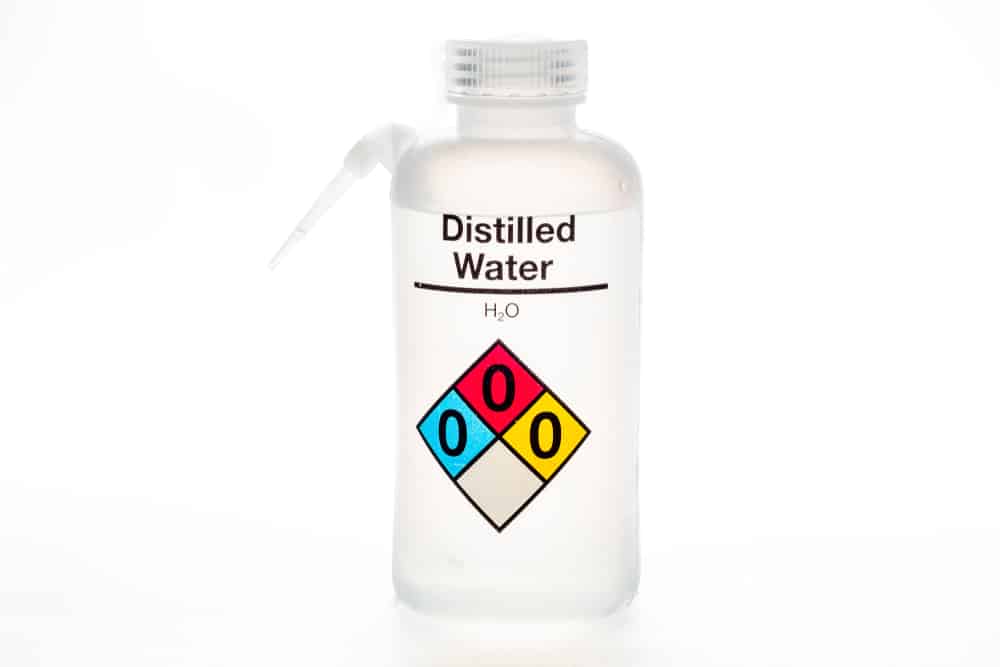Nearly everyone has opened the freezer, searching for a few ice cubes, and found nothing but a tapped out ice maker or a few empty ice cube trays instead.
Are you left with either a mad dash to the gas station for a bag of ice or a disappointingly tepid drink while you wait for your ice to freeze overnight? Not necessarily.
Conventionally, it will take three to six hours to freeze water in an ice tray in a traditional kitchen freezer. However, with a bit of know-how, you can cut that time down significantly.
Let’s find out how long ice production takes in the freezer. All you need is a freezer, an ice cube tray, water, and a science lesson.
In this article, we assume you are using a household freezer rather than an ice maker. Chest freezers or commercial units have different capabilities not discussed here.
Your freezer temperature is an essential factor in how quickly the water will freeze. Most household freezers are set to an ideal temperature of 0 degrees Fahrenheit (-17.8 degrees Celsius) if kept at the recommended level.
However, the adjustment dial (usually located in the refrigerator portion of the unit) will allow you to lower the temperature even more. Obviously, the colder the freezer, the more quickly the water will freeze.
What is in your freezer besides that ice bin? A new haul from the grocery store will temporarily raise the overall temperature as the contents reach freezing temperature.
Cooked foods should be completely cool before placing them in the freezer. Warm leftovers placed directly in the freezer will raise the overall temperature.
They may cause other things to begin to thaw partially, which may cause bacteria to grow.
Another factor that will prevent your freezer from maintaining its ideal temperature is empty space. A freezer that is 75% full will hold its temperature and work more efficiently.
Even a recycled milk jug filled with water will help maintain that ideal 0 degrees, just by taking up space. Those freezer packs for lunch boxes can do double duty by helping keep your freezer nice and cold when not in use.
A newer, “high-efficiency” refrigerator unit will be more, well, efficient. Older models will work harder, use more electricity, and take longer to bring the contents of both the fridge and the freezer to the desired temperatures.
Check with your utility company to see what incentives they offer if you decide to upgrade to a more efficient unit. Your ice cubes will freeze faster, and your electric bill may significantly decrease. A win-win!
There are all sorts of material options available today, from plastic to silicon, to metal, not to mention all shapes and sizes. The smaller the ice cube, the more quickly it will freeze.
For our purposes in this article, we will assume you are using a standard ice tray made of plastic that makes 12 ice cubes, with each section using about one to two tablespoons of water.

A plastic ice cube tray being filled with water
However, metal ice cube trays like they used in Grandma’s day (often made of aluminum) will hold its own cold temperature more efficiently and freeze the water more quickly.
A modern stainless steel metal ice tray (complete with that old-fashioned lever for popping out the ice cubes) boasts a cleaner, fresher taste to the ice. But unlike a $1 or $2 price tag that you will find at a discount store for a basic plastic tray, you can spend $30 for a stainless steel version.

An old school stainless steel ice cube tray
If choosing plastic trays, it is safest to buy them new rather than second-hand. There is no way to determine what safety standards were in place when manufactured. Today you can look for BPA-free labeling. This is an essential factor, especially if you start with boiling water.
Boiling water, you ask? Read on to discover the surprising hack that can cut down the time to make ice cubes in the freezer.
On the molecular level, hot water and cold water are not all that different.
In its liquid state, no matter its temperature, water has a loose, flowy molecular structure (you may have noticed whether you spill your hot coffee or your ice-cold lemonade, you make a mess either way). But does the temperature of the water affect how quickly the water will freeze?
It seems obvious that colder water will freeze more quickly than hot, but actually, the opposite is true. Hot and even boiling water changes to a solid-state in less time than it takes cold water. This phenomenon was discovered in modern times by an African schoolboy.
In 1969 a Tanzanian high school student named Erasto Mpemba made ice cream in his science class. After dissolving sugar into boiled milk, he immediately popped his mixture into the freezer, while his classmates followed the teacher’s instructions to allow the mixture to cool before freezing it.
The hot mixture achieved ice cream status more quickly than the cooled versions, the scientific community was intrigued, and the rest is history. Overall freezing time was seemingly reduced when using warm water or hot water.
Speaking of history, young Erasto Mpemba was not the first inquiring mind to notice this curiosity that now bears his name. Philosophers Aristotle, Rene Descartes, and Francis Bacon all make passing notes of it in their writings, though they do not attempt to explain it.
Scientists have been attempting to discover why this is so for over 50 years, but various possibilities (evaporation, supercooling, convection, and others) have remained theories. The Mpemba Effect is repeatable and observable and therefore presumed to be scientific fact, but the science of why it is true is not settled.
The reasons behind this apparent effect may be due to impurities in the water. Distilled water will almost certainly freeze faster than tap water that hasn’t passed through a water filter.
The impurities in tap water can contain a variety of substances - including salts - that can inhibit the overall freezing time. Salts can actually work to lower the freezing point of water which can increase the time it takes for water to freeze.
In the spirit of scientific discovery, let us conduct our own experiment and make two trays of ice, one with cold water and one with boiling water. For record-keeping purposes, we are using two identical plastic trays with sections that hold one tablespoon of water.
The freezer is a regular kitchen unit full of already frozen food. We will check back in with our experiment in half-hour increments. See you then!
We’ll be using a standard freezer - a regular kitchen unit full of already frozen food. The freezer temperature will be 0 degrees Fahrenheit - the recommended temperature for consistent freezing. This is well below the required temperature for freezing ice (32 degrees Fahrenheit).
Neither tray has frozen, but the tray with the boiling water has a thicker layer of ice formation on the surface. The bottoms of both trays feel equally cold.
The tray with the boiling water is frozen. The ice can easily be removed. The other tray is about half frozen. How long does it take to make ice cubes in the freezer? As little as an hour, if you begin with boiling water and a cold freezer. However, our experiment continues.
The cold water tray is getting there, but not quite.
The cold water tray is passable, and the ice could be used to chill drinks, but if you twist the tray, little pockets of water are made visible in each ice crystal.
The cold water tray is finally frozen.
Using the conventional, cold water method, err on the safe side and assume you will need more than three hours to make ice cubes in the freezer.
Or cut that time by two-thirds and start with boiling water. It’s not magic. It’s the Mpemba Effect!
In addition to significantly decreasing the wait time, an exciting advantage to using boiling water is clear ice cubes instead of cloudy ice cubes. Preparing fancy drinks for a gathering might be another reason to start with hot water.
For safety reasons, keep the trays near the top of the freezer and away from any foods affected by the short-lived warmth.

It may seem strange, but distilled water will freeze a bit more quickly than tap water in the freezer
A bit over three hours based on the experiment above.
The overall freezing time is dependent on a number of factors:
For example, you want to make sure that your evaporator fan is functioning properly and there are no blockages in air flow. Properly circulating air throughout your freezer will aid the freezing process.
Distilled water will freeze much more quickly than tap water. Tap water isn't pure water and contains impurities, including some salts, which results in tap water actually having a slightly lower freezing point than distilled water (0 degrees Fahrenheit).
Most ice cubes are cloudy due to a combination of air bubbles from dissolved gas, from impurities within the water. Directional Freezing is a method to create crystal clear ice cubes. The ice only freezes from one direction. As an example, one way to achieve this is to insulate all the sides of your metal ice cube tray except for the very top of the tray. The ice will freeze from the top down, creating a clear layer of ice on the top of the ice cube.
If you have a refrigerator with an ice maker, the process to make the ice takes around 90 minutes. The ice cube mold within the ice maker is filled with water where the ice freezes into cubes. Once the freezing process is complete, the ice cubes are dispensed from the ice mold about an hour and a half later. Note that if you have a brand new refrigerator, you’re probably going to want to throw out the first batch of ice so as to not ingest any impurities that might be in the water line.
